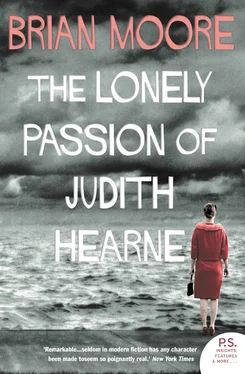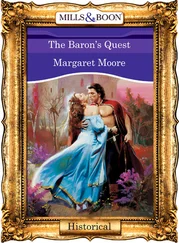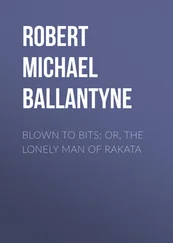‘Sit up close to the fire now. It’s perishing cold out,’ Mrs Henry Rice said. A Dublin voice, Miss Hearne thought. But not quite. She has a touch of the North in her accent.
Miss Hearne saw that there were two wing chairs pushed close to the fire. She went towards one of them and it turned around and a man was in it.
He was a horrid-looking fellow. Fat as a pig he was, and his face was the colour of cottage cheese. His collar was unbuttoned and his silk tie was spotted with egg stain. His stomach stuck out like a sagging pillow and his little thin legs fell away under it to end in torn felt slippers. He was all bristly blond jowls, tiny puffy hands and long blond curly hair, like some monstrous baby swelled to man size.
‘This is Bernard, my only boy,’ said Mrs Henry Rice. ‘This is Miss Hearne, Bernie. Remember, I told you about her coming to stay with us?’
He stared at Miss Hearne with bloodshot eyes, rejecting her as all males had before him. Then he smiled, showing dirty yellow teeth.
‘Come and sit by the fire, Miss Hearne,’ he said. ‘Take the other chair. Mama won’t mind.’
Rejected, Miss Hearne sat down, fiddled with her garnet rings, moved her thin legs together and peered for comfort at her long, pointed shoes with the little buttons on them, winking up at her like wise little friendly eyes. Little shoe eyes, always there.
‘Sugar and cream?’ Mrs Henry Rice asked, bending over the tea things.
‘Two lumps, please. And just a soupçon of cream,’ Miss Hearne said, smiling her thanks.
‘Cup of tea, Bernie?’
‘No, thanks, Mama,’ the fat man said. His voice was soft and compelling and it shocked Miss Hearne that this ugly pudding should possess it. It reminded her of the time she had seen Beniamino Gigli, the Italian tenor. A fat, perspiring man with a horrid face, wiping the perspiration away with a white handkerchief. And then, when he opened his mouth, you forgot everything and he became a wonderful angel, thrilling everyone in the theatre, from the front stalls to the gods. When Bernard spoke, you wanted to listen.
‘Just a little cup, dear?’
‘No, Mama.’
‘Miss Hearne.’ Mrs Henry Rice handed a teacup with the little silver teaspoon clattering in the saucer. Miss Hearne steadied the spoon and smiled her thanks.
‘And have you lived long in Belfast, did you say?’ Mrs Henry Rice said, poking the fire into a good blaze.
‘O, since I was a child, yes,’ Miss Hearne said. ‘You see, my aunt lived here, although my parents lived in Ballymena.’
‘I see,’ said Mrs Henry Rice, who did not see. ‘And whereabouts did your aunt live? Was it on this side of the city?’
‘O, yes,’ Miss Hearne said. ‘It was on the Lisburn Road. You see, my parents died when I was very young and my dear aunt, rest her soul, took me to live with her in Belfast.’
‘Well, we all have to move around,’ Mrs Henry Rice said. ‘I was born and raised myself in Donegal, in a little place called Creeslough. And then, when I was only a bit of a girl, I was packed off to Dublin to attend a secretarial college. And lived there with an uncle of mine. And met my late husband there. And then, Mr Rice, that’s my late husband, he was posted from Dublin to Belfast. And here I am. It just goes to show you, we all have to run from pillar to post, and you never know where you’ll end up.’
‘Indeed,’ Miss Hearne said. ‘But it must have been interesting for you, living in Dublin for so many years.’
‘O, Dublin’s a grand city, no doubt about it. I’ve never been what you might call fond of Belfast. Of course, it’s not the same for you. You’d have lots of friends here. Is your poor aunt dead long?’
‘A few years ago,’ Miss Hearne said guardedly.
‘And do you have relatives here?’ Mrs Henry Rice asked, offering a plate of Jacob’s cream puff biscuits.
‘Not close relatives,’ Miss Hearne said, fencing her way over familiar ground. They were all a bit nosey, landladies, it was to be expected, of course. They had to know what class of people they were getting, and a good thing too. You couldn’t blame them.
‘My aunt came from a very old Belfast family,’ she said. ‘They’ve nearly all died out now, but they have a very interesting history, my aunt’s people. For instance, they’re all buried out in Nun’s Bush. That’s one of the oldest cemeteries in the country. Full up now. It’s closed, you know.’
‘Well, that’s interesting,’ Mrs Henry Rice said, uninterested. ‘Have a bikky, Bernie?’
‘No thanks, Mama.’
He yawned, patting the opened circle of his mouth with a puffy hand. Above the yawn his eyes, unblinking, watched Miss Hearne, bringing the hot blood to her face.
‘I do believe I’ll just throw off this cardigan, if you don’t mind.’
‘I’ll hold your cup,’ Mrs Henry Rice offered amiably. ‘This room does get a little hot with a good fire going. But Bernie feels the cold a lot, always has.’
Who does he think he is, no manners, staring like that. Give him a stiff look myself. But no, no, he’s still looking. Upsetting. Turn to something else. That book, beside him, upside down, it’s esrev , verse, yes, English Century Seventeenth. Reading it, yes, he has a bookmark in it.
‘I see you’re interested in poetry, Mr Rice.’
‘O, Bernie’s a poet. And always studying. He’s at the university.’
‘I am not at the university, Mama,’ the fat man said. ‘I haven’t been at Queen’s for five years.’
‘Bernie’s a little delicate, Miss Hearne. He had to stop his studies a while back. Anyway, I think the boys work too hard up there at Queen’s. I always say it’s better to take your time. A young fellow like Bernie has lots of time, no need to rush through life. Take your time and you’ll live longer.’
That fatty must be thirty, if he’s a day, Miss Hearne told herself. Something about him. Not a toper, but something. O, the cross some mothers have to bear.
And the cross brought back the Sacred Heart, lying on the bed in the room upstairs, waiting for a hammer to nail Him up. Still, it was nice to sit here in front of a good warm fire with a cup of tea in your hand. And besides, Mrs Henry Rice and this horrid fatty would make an interesting tale to tell when she saw the O’Neills.
For it was important to have things to tell which interested your friends. And Miss Hearne had always been able to find interesting happenings where other people would find only dullness. It was, she often felt, a gift which was one of the great rewards of a solitary life. And a necessary gift. Because, when you were a single girl, you had to find interesting things to talk about. Other women always had their children and shopping and running a house to chat about. Besides which, their husbands often told them interesting stories. But a single girl was in a different position. People simply didn’t want to hear how she managed things like accommodation and budgets. She had to find other subjects and other subjects were mostly other people. So people she knew, people she had heard of, people she saw in the street, people she had read about, they all had to be collected and gone through like a basket of sewing so that the most interesting bits about them could be picked out and fitted together to make conversation. And that was why even a queer fellow like this Bernard Rice was a blessing in his own way. He was so funny and horrible with his ‘Yes, Mama,’ and ‘No, Mama,’ and his long blond baby hair. He’d make a tale for the O’Neills at Sunday tea.
So Miss Hearne decided to let the Sacred Heart wait. She smiled, instead, at Bernard and asked him what he had been studying at the university.
‘Arts,’ he said.
Читать дальше












